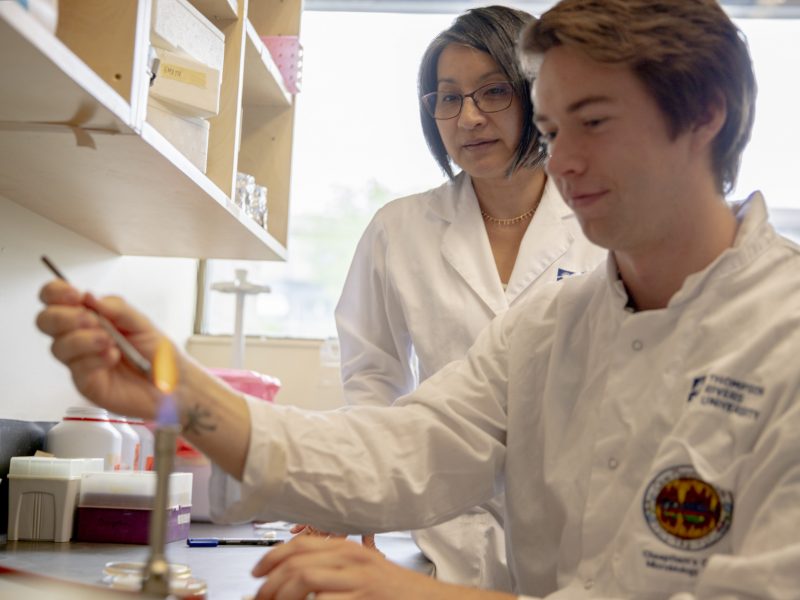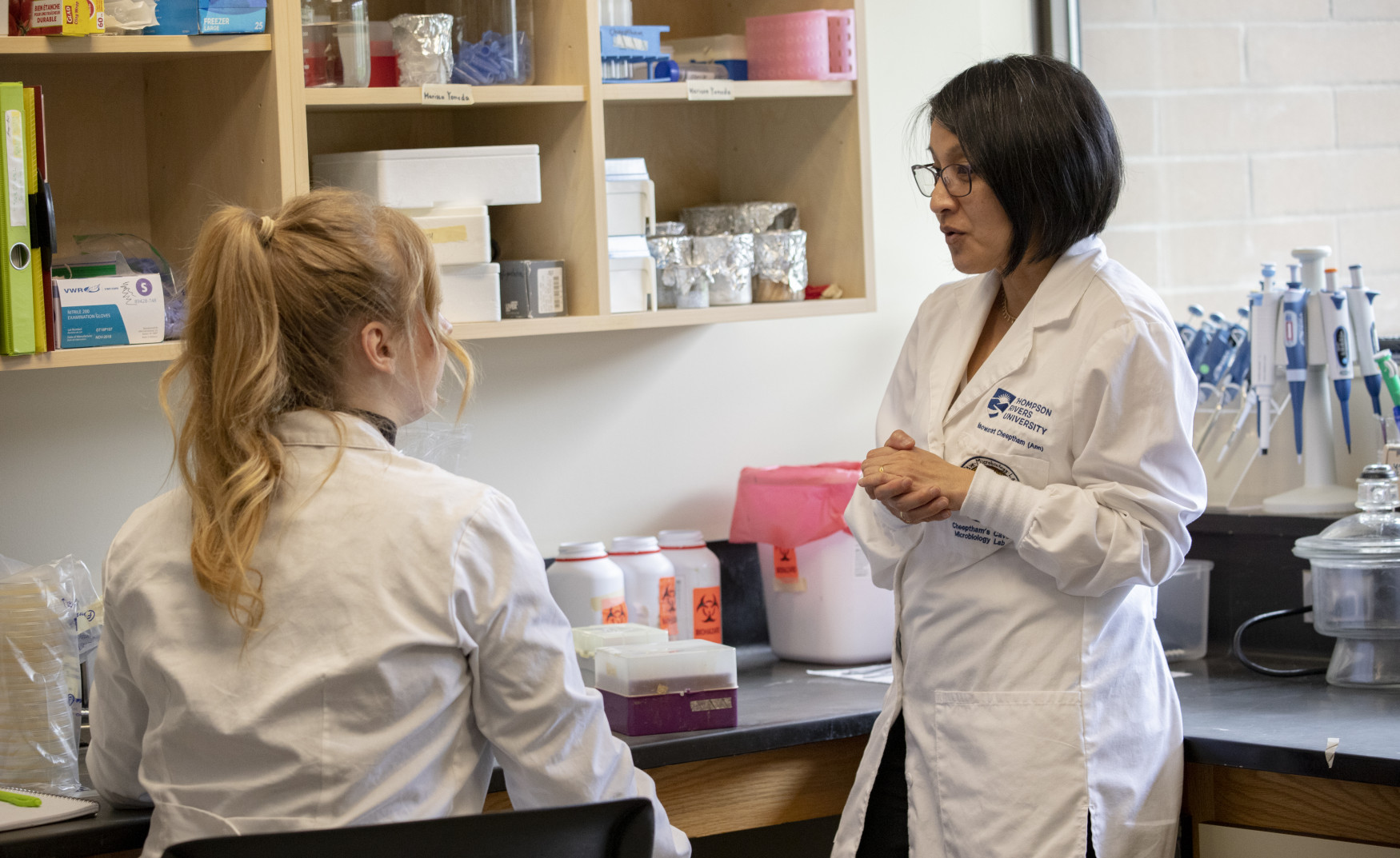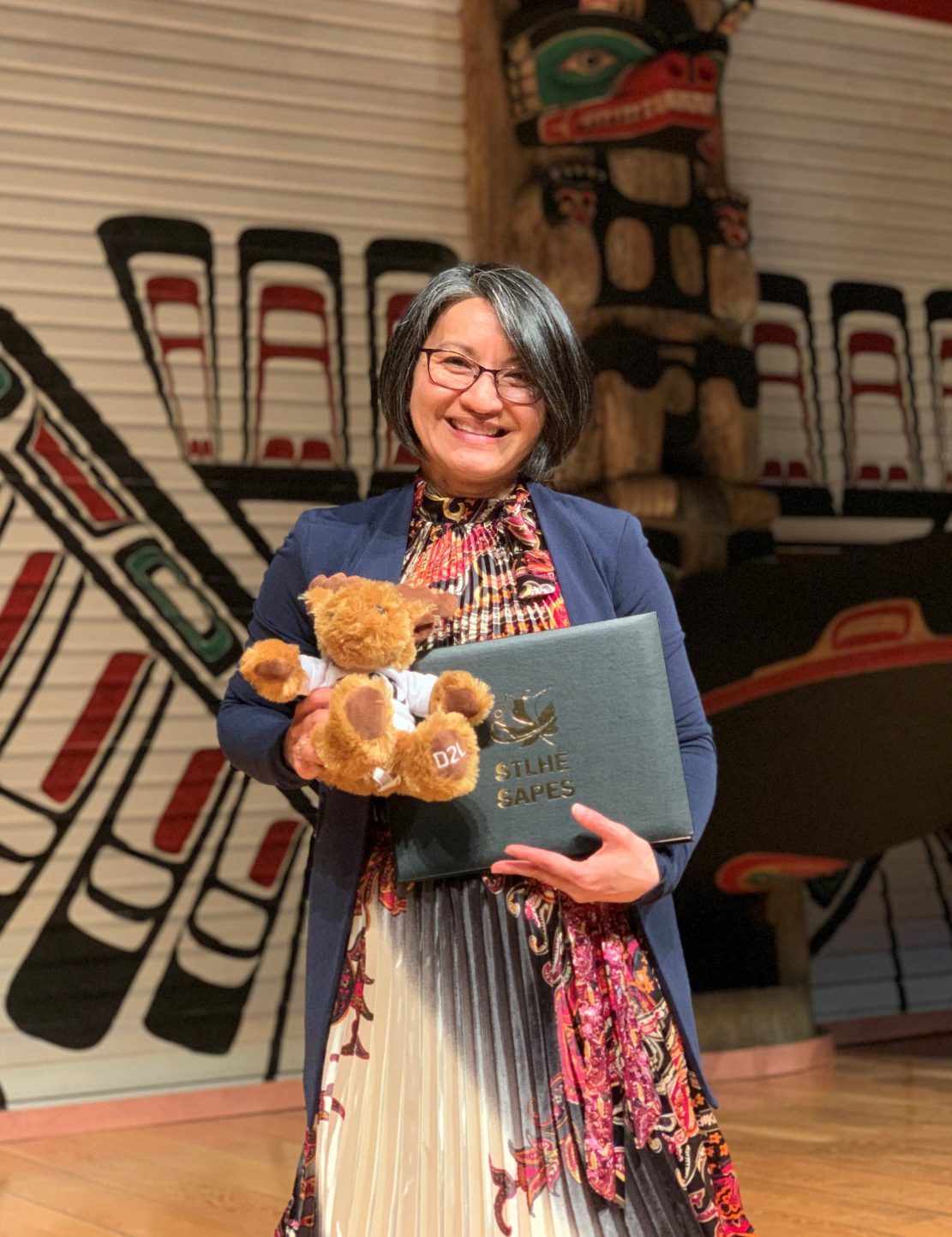
She jokes about her petite stature as being apt as she is a ‘micro’ biologist. She is part of a visible minority and a woman working in the male-dominated field of science.
But make no mistake: Dr. Naowarat (Ann) Cheeptham is a ‘macro’ influence on the lives of her students and on TRU. That’s why she was one of 10 recipients from across Canada for this year’s 3M National Teaching Fellowship Award at an annual conference June 6 to 10 in Ottawa.
The 3M National Teaching Fellowship is Canada’s most prestigious recognition of excellence in educational leadership and teaching at the post-secondary level. Since it was established in 1986, more than 340 fellows have been chosen (up to 10 per year) for the honour.
Cheeptham, whose main research projects involve bacteria found in caves and probiotic solutions to treating white-nose fungus in bats, is a positive energy in the classroom who makes her students feel respected and included, and inspires young women entering science.
Not sure about science
Yet she wasn’t passionate about science when she initially went to university. It was a way to get her tuition covered.
Born and raised in Nakhon Sawan, central Thailand, and educated in Chiang Mai in northern Thailand, Cheeptham’s family couldn’t afford to send her to university. But the government could.

Dr. Naowarat (Ann) Cheeptham discusses bat research with student Sara Lawrence.
“The Thai government in the 1980s had the idea that if you put money into creating more scientists, the country could move forward,” she said. “I didn’t even know if I would like to be a scientist.”
She was one of 25 students chosen for the government program, studying at Faculty of Science, Chiang Mai University. After earning her BSc, she was one of 50 Thai students awarded the MEXT Monbusho Japanese Scholarship to get her PhD at Hokkaido University in Japan, where she fell in love with applied microbiology and with her future husband, Canadian Joe Dobson.
After graduating from Hokkaido, she was required to put in two years of service in Thailand at Chiang Mai University. One of the scientists there mentored her; he didn’t just teach about facts and processes, he asked students how they were doing and got to know them.
“That set the tone for me in my role of being a mentor,” she said. “That spills over to my students. I’m curious about my students.”
After those two years, Cheeptham and Dobson moved to Canada. She took a post-doctorate degree at UBC, then worked for a biotech company in Langley, where she was doing fast-paced, ‘sellable’ research that she didn’t find rewarding.
On a cool February day in 2002, the couple drove to the BC Interior to do some cross-country skiing at Stake Lake and set in motion changes that determined the next two decades of her life.
Cheeptham saw a sign for University College of the Cariboo (before it was TRU) and realized she wanted to return to research and teaching in an academic setting.
“I checked the website and there was a microbiology position.”
Two years becomes two decades
Cheeptham became the first microbiologist at the institution.
After living in the lush climates of Thailand and the Lower Mainland, the Kamloops landscape was sparse and dry. Cheeptham and Dobson initially questioned their decision to move.

Naowarat (Ann) Cheeptham accepting her 3M Fellowship Award.
“He looked around and said ‘Let’s give it two years here,’” she recalled. That was 20 years ago.
“It has its own beauty here.”
As Cheeptham has grown to love the Kamloops landscape, so too has she grown as a teacher.
“Throughout my 22 years of formal teaching, in Thailand and in Canada, my approach changes all the time. Students are my teachers too. I learn from them.”
Joey Egeland is in his fourth year in sciences and has been in Cheeptham’s classes since his second year.
“She’s super involved, easy to talk to and very accommodating. She’s very outgoing and focused on students and their success. That’s something that’s very special about Ann,” he said.
“She’s very knowledgeable so in the lab she’s got lots of great ideas.”
Third-year cellular microbiology student Sara Lawrence described Cheeptham’s teaching style as friendly, warm and non-judgmental, which makes students feel safe in seeking knowledge.
“There’s no such thing as a dumb question. She is a fantastic teacher. She makes the classroom so warm and welcoming.”
Cheeptham makes herself available after hours, is easy to reach and emphasizes diversity and inclusion in class, Lawrence said.
“She makes students feel comfortable talking to her. All questions are welcome in her class. Ann stands out with her inclusivity with all students and with her ability to teach these real-world concepts. She cares about her subject and that we learn it.”
Cheeptham has a good understanding of what students experience and that comes through, Lawrence said.
“In our microbiology class, she tried to learn all 96 students’ names. She goes above and beyond so students know their learning is valued,” she said.
“She makes sure to tell a funny story when a topic gets boring or difficult,” she added.
This summer, Lawrence is working on Cheeptham’s research around the use of probiotics to treat white-nose syndrome in bats – it’s a fungus that is easily spread and killing large numbers of bats.
Learning by experiencing
While she was trained mostly with books and chalkboards and laboratories, Cheeptham takes a different approach with her own students.
“I try to bring in real-world applications and relevant information.”
For example, students who have learned about microbes actually cook a full ‘fermentation dinner’ together.
She compared the uniqueness of her students to that of the caves she explores for unique microbes.
“Each cave is so unique in itself. No two caves are the same. Students are not the same, in my eyes. They are unique of themselves, just like the caves I have studied” she said. “I want to teach my students to be critical thinkers.”
While Cheeptham has won other awards, the 3M National Teaching Fellowship stands out as a prestigious honour and an acknowledgment of her efforts to be the best teacher possible.
“Any award that I’ve received, besides being humbled and honoured, I always feel grateful to everyone in my life. I couldn’t have gotten here by myself. . . . Students have taught me to be a better educator.”
To be in a fellowship with others who make students their focus is inspiring and a privilege, she said.
“People look up to us as professors,” she said. “I’d like to use this privilege to further my own learning. I would like to lead by example.”
 Police watchdog called in
Police watchdog called in Mayor calls 'BS' on list
Mayor calls 'BS' on list U.S. authorities find bodies
U.S. authorities find bodies Premier stands by pick
Premier stands by pick Canada's most-wanted list
Canada's most-wanted list Sask. will still get rebates
Sask. will still get rebates Santos ends comeback bid
Santos ends comeback bid Douglas C-54 plane crashes
Douglas C-54 plane crashes Trump's 'eyes and ears'
Trump's 'eyes and ears' US TikTok ban sent to Biden
US TikTok ban sent to Biden Phish fans enter the Sphere
Phish fans enter the Sphere CN Rail profits fall
CN Rail profits fall  Warriors snakebitten in loss
Warriors snakebitten in loss Iginla off to Europe
Iginla off to Europe Rockets ink prospect
Rockets ink prospect Alleged Tupac killer in court
Alleged Tupac killer in court Lawsuit accuses Megan
Lawsuit accuses Megan Bam Margera’s tour axed
Bam Margera’s tour axed




